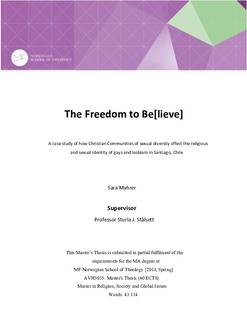The Freedom to Be[lieve]: a case study of how Christian Communities of sexual diversity affect the religious and sexual identity of gays and lesbians in Santiago, Chile
Master thesis
Permanent lenke
http://hdl.handle.net/11250/2501999Utgivelsesdato
2018Metadata
Vis full innførselSamlinger
Sammendrag
Christian gays and lesbians have experienced losing their position and being discriminated within their church community due to their sexual identity. With these experiences, other Christian communities continue fighting for the inclusion of people of sexual diversity.
This is a study that focuses on the coexistence of religious and sexual and religious sexual identity. It explores how it may be possible to be a Christian community that lets everyone participate without the feeling of having to hide one´s sexual identity and what such a community might mean to its participants. The fact that the subject of religion and sexuality is still a very complicated terrain hence difficult to discuss for many, illustrates the importance of this thesis. With lack of inclusion comes lack of understanding of one´s differences. Those who have to leave their religious communities risk losing their faith as well because they believe they cannot be Christian and be gay or lesbian at the same time. In my thesis, I seek to understand better the journey towards this double recognition of religious and sexual identity.
This study is based in Santiago, Chile and has been conducted with the use of qualitative research methods, such as in-depth interviews and observation of workshops and masses, mainly with members of different Christian Communities called PADIS, IELCH and ICM, that focus on the inclusion of Christians of sexual diversity. The majority of the informants in this study are gays and lesbians. By focusing on the experience of attending such a community the research question for this thesis is as follows: in what ways does being part of a Christian Community of sexual diversity affect the religious and sexual identity of gays and lesbians in Santiago, Chile?
My findings show how the informants were enabled to return to practice their faith through these Christian Communities and how these communities created a safe space for them to reflect, share and grow within their religious and sexual identity in solidarity with others. I illustrate the difficulties of reaching other people of sexual diversity that is not gay men, due to differences in visibility between private and public space as well as the lack of permanent attending members. I illustrate the Christian diversity within these groups, and further illustrate the experiences of discrimination between the religious and the secular LGBTQ community and the challenges of solidarity due to differences in values and purposes.
My final conclusion of this research is that through active participation in a Christian Community that embraces sexual diversity, the informants experience personal development and ownership of their religious and sexual identity that they earlier thought was impossible. Informants have expressed that without this kind of safe space within a Christian Community of sexual diversity, they would not have reached this state of a more complete self-acceptance with the coexistence of both identities.
